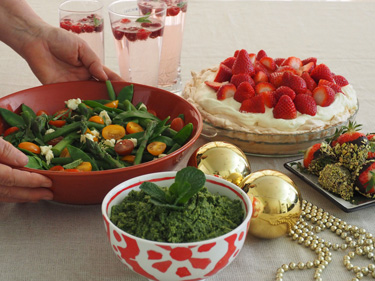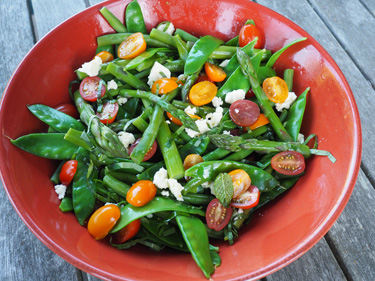Jewels for the Christmas feast
Christmas for me is all about family, relaxation and food. And for as long as I can remember, in my family it has been associated with food from our early summer gardens.
Certain dishes on our Christmas table are a given. There always has to be a butterflied, barbecued leg of lamb and, very importantly, a bowl of Dad’s freshly dug potatoes scrubbed clean, boiled in salted water with sprigs of mint and served with a generous dollop of butter melted.
Just as important is mum’s Heavenly Pie from the NZ Country Women’s Institute cook book. This is a divine upside down lemon meringue pie, made with the last of the season’s lemons. I like it best served with a pile of strawberries. After these celebrated dishes, the gaps on the table are generously filled with bowls of various seasonal vegetables prepared according to the whim of the contributing cooks.
Over-indulgence is excused for the day. But upon reflection, our family Christmas dinners are pretty healthy, if a bit rich. Actually, if I was to eat just half of what I usually end up eating (and skip the Heavenly Pie), I would probably end the day feeling I could happily eat like that every day!
How to keep your Christmas day (relatively) healthy - wherever you are:
- Drink lots of water. Treat yourself to bottles of sparkling water as if they were bottles of wine! Alternating glasses of water with wine is always a good practice. Have beautiful jugs of water with slices of lemon (or frozen berries) and fresh herbs to remind everyone to drink a little more H₂O. The more water you drink, the more your metabolism gets going and the faster your body will burn calories. Alcohol, on the other hand causes the dramatic spikes in blood sugar that can trigger unhealthy cravings.
- Stay active. Plan a good walk, swim or run on Christmas day.
- Obey the ‘two-thirds’ rule. This is the everyday rule that two thirds of your plate should consist of different coloured vegetables (preferably some raw in a salad for the vitamins and enzymes otherwise lost in cooking). This way you will ensure you eat enough fibre to maintain a healthy and robust digestion.
- Savour every mouthful! Don’t beat yourself up if you over indulge but instead remember how deliciously divine the day was and how it will satisfy you for the next 364 days of your life!
Fresh from the garden
Veges and fruits are extra special when served fresh from the garden. They deserve to be eaten with as little intervention as possible. The more we can eat raw, the healthier we will be. However a light culinary touch brings out the best in them for the Christmas table.
- Peas and beans – whether you’re eating them warm or cold, blanch them in boiling water to enhance their stunning colour. Mix them with asparagus for a colourful Christmas salad (see recipe left).
- New potatoes – simmer until cooked and roll in butter or extra virgin olive oil with finely chopped mint.
- Radishes – make a crunchy salad with a tasty anchovy dressing.
- Asparagus – eat it raw with a delicious dip, or blanch quickly in boiling water and add to a summer salad (see recipe left).
- Baby beetroot – bring out their sweetness by roasting them in a little butter and a sprinkling of chopped fresh rosemary. Extra festive if you grow a mixture of red and yellow coloured beets.
- Baby carrots – boil until just soft and roll in butter and fresh herbs, such as parsley, chervil, dill or coriander.
- Zucchini – baby zucchini are the sweetest! Slice them lengthways and quickly sauté in garlic butter for a minute or two, with a sprinkling of fresh herbs. Stuffed zucchini flowers make a wonderful addition to a party platter.
- Fresh herbs – use them liberally as flavouring and garnish and make bright green pesto to use now or freeze for later.
- Strawberries - Leaving the stalks on, dip in dark chocolate then roll in chopped toasted pistachio nuts.
- Raspberries – fill a bowl and serve them just as they are. If you only have a few, mix them with strawberries and blueberries or use them to decorate a pavlova or Heavenly Pie. Place a few frozen raspberries and a sprig of mint in a beautiful glass and fill with sparkling water for a refreshing, non-alcoholic Christmas drink.
Recipes can be found under the ‘resources’ tab on my website: www.healnaturally.co.nz
Summer garden legumes with asparagus and lemon herb dressing
500g mixed freshly picked beans
100g sugar snap peas
250g asparagus
250g cherry tomatoes
200g of a hard feta cheese, suitable for crumbling into chunky bits (optional)
Cut beans and asparagus in half crossways (or to a similar length to the peas).
Bring a large saucepan of salted water (roughly 1 tsp salt, depending on how big your pot is) to the boil; blanch each type of green vegetable separately before cooling in a large bowl of iced water; drain and dry by laying in a single layer on a tea towel. At this stage these blanched vegetables can be stored in an airtight container in the fridge for up to 24 hours.
Dressing:
¼ cup firmly packed Italian or curly parsley
¼ cup firmly packed mint leaves
zest and juice of 1 good sized lemon
salt and pepper
¼ cup extra virgin olive oil
Blend dressing ingredients in a small food processor or blender, taste and adjust seasoning as needed.
Dressing can be stored in the fridge for 24 hours but is at its best as fresh as possible, to catch the flavours of the fresh herbs at their glory.
To assemble, cut cherry tomatoes in half and gently toss with the blanched vegetables, roughly crumbled feta cheese and dressing.
Mint and pistachio pesto
This is a stunning pesto - a great healthy alternative to our traditional mint sauce and the perfect accompaniment to a butterflied, marinated and barbecued leg of lamb.
1 cup tightly packed mint leaves
1/3 cup roasted salted and shelled pistachio nuts
1 clove garlic, roughly chopped
¼ teaspoon salt
Freshly ground pepper
1 tsp fresh lemon or lime juice
¼ cup extra virgin olive oil (approximately)
Using a food processor roughly chop together the mint, pistachios, garlic, salt and pepper with the lemon/lime juice. Keep scraping down the sides and while food processor is running, add the extra virgin olive oil through the top hole of the lid in a slow and steady stream until the consistency is to your liking. Taste and adjust seasoning. Will keep several days in the fridge but is at its best eaten on the same day.
Meryn Wakelin is a naturopath and nutrition consultant. www.healnaturally.co.nz
9-Nov-2015


Summer garden legumes with asparagus and lemon herb dressing


